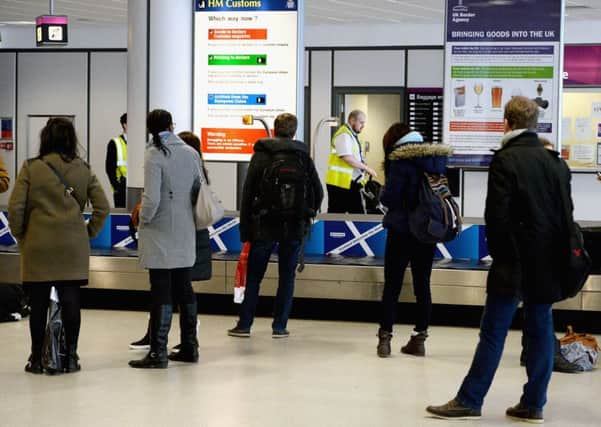Carolyn McCall: SNP must be bold and cut Air Passenger Duty


Imagine the scene in April 2018.
Aberdeen airport would have a network far beyond its current links, allowing people planning their summer holidays to choose from a wider range of direct, non-stop flights to Mediterranean destinations.
Glasgow-based businesses could confidently trade across more of Europe, with new direct flights to important European cities. The “second city of the Empire” would have the direct flights it deserves to more of Europe’s major cities including Hamburg, Venice, Lisbon and Basel; without having to battle down the M8.
Advertisement
Hide AdAdvertisement
Hide AdEdinburgh’s trams – as well as its taxis and buses – would be full with new tourists, from parts of Europe and the rest of the world with direct flights to the Scottish capital for the first time.
The long-haul airlines would expand their flights to and from Scotland, building on the links already established by the Middle Eastern and North American carriers. The APD reduction could be the change which finally delivers the first direct flight between Scotland and China.
All this will be possible if the Scottish Government delivers its commitment to halve Air Passenger Duty, currently £13 tax for each passenger on short haul flights departing from UK airports and up to £146 for long haul business travellers.
But to fully realise the benefits the government must be bold and make the cut in one move in 2018 to give a clear signal to the world that Scotland is open for business and to ensure that on APD-Day on 1 April 2018 we see new aircraft lining up at airports across Scotland.
The UK has the highest aviation tax in Europe. If APD is halved Scotland would be significantly more competitive with other European countries and in a much better position than the rest of the UK.
The change would also give real support to tourism in Scotland. Visitors to Scotland spend more than £3.6 billion every year. Around half of this spending is by tourists from England, Wales and Northern Ireland who currently pay APD on their flights both to and from Scotland.
Around a third of passengers travelling to and from Scotland do so for business reasons and that’s why the Scottish Government recognises that cutting the tax will boost the Scottish economy. Research by PwC has shown that halving APD would positively affect jobs and growth, as well as public finances. The increased business and tourist activity will generate more revenue from other taxes, providing a net gain.
To achieve a step change in connectivity there also needs to be a step change in the taxation. A single 50 per cent cut in 2018 would get Scotland to the tipping point where airlines could confidently make these big investment decisions and bring these benefits more quickly. EasyJet’s plans help make the case. With a halving of APD we would expect to increase our flights to and from Scotland by around 30 per cent, which would increase passenger numbers from 5.5 million to over seven million. These increases would also bring new jobs in the aviation sector.
Advertisement
Hide AdAdvertisement
Hide AdAviation policy must also take in to account the environmental impact of flights. When APD was introduced in 1994 it was described as an environmental tax, but now the UK Government describes it as primarily a revenue raising tax. And aviation is already covered by the EU Emissions Trading Scheme.
The aviation industry is investing to reduce our environmental impact. For easyJet’s part, our carbon emissions per passenger kilometre decreased by more than a quarter between 2001 and 2013 and we are making progress on our target of a further 8 per cent reduction between 2013 and 2020.
The tax achieves little environmentally, and instead is a drag on jobs and growth.
The Scottish Government can help to make a step change in connectivity for Scotland, and the economic benefits that come with this, if APD is halved in April 2018.
We look forward to working with them to deliver that change for Scotland.
Carolyn McCall is chief executive of easyJet